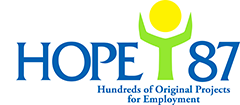A Safer Tomorrow - Institutionalizing Disaster Preparedness in the education sector
Building on the success and the knowledge gained during the preceding project, the current one focuses on the integration of the “School Based Disaster Risk Management” (SBDRM) model into the governmental system of the Pakistani Province of Khyber Pakhtunkhwa (KP).
This SBDRM model has been developed in close cooperation with the DIPECHO partners in the course of the DIPECHO 7th Action Plan. The project is co-financed by ECHO, ADC and HOPE’87.
According to the concept of “Comprehensive School Safety” the main goals of the project include:
· to protect learners and education workers from death, injury and harm in schools
· to plan for educational continuity in the face of all expected hazards and threats
· to safeguard education sector investments
· to strengthen risk reduction and resilience through education
The SBDRM model concentrates on the strengthening of the second pillar - the introduction of disaster and risk management at school level. The models’ purpose is to establish a sustainable system through which the different actors of the Pakistani education system (on national, provincial, community and school level) are integrated into the school disaster and risk management and act in close cooperation with national and international NGOs and other relevant stakeholders.
Moreover, this project strengthens the capacities of the responsible authorities on different levels, thus the SBDRM-model could be replicated on the community and school level. Therefore, the lessons learned from the previous project have been further developed and adapted to the specific needs of the beneficiaries.
The replication process is established through a multilevel training, which is in the government’s responsibility, to guarantee the institutionalisation of this model. The whole process is monitored by HOPE’87. The learning results serve as a basis for the development of a «school improvement plan», which includes disaster management and risk reduction.
The specific project results are:
- An improved inclusive SBDRM model with approaches and tools is institutionalised into the government workflow in a supportive environment in KPK province.
- Enhanced coordination, advocacy and awareness for inclusive and mutually reinforcing CBDRM and SBDRM at all levels.
The whole planning and implementation of the project takes place in close cooperation with a second ECHO-financed project in Pakistan implemented by CARE, which focuses on “Community Based Disaster Risk Management” (CBDRM). In the course of action, the establishment of common models and approaches will be fostered.
